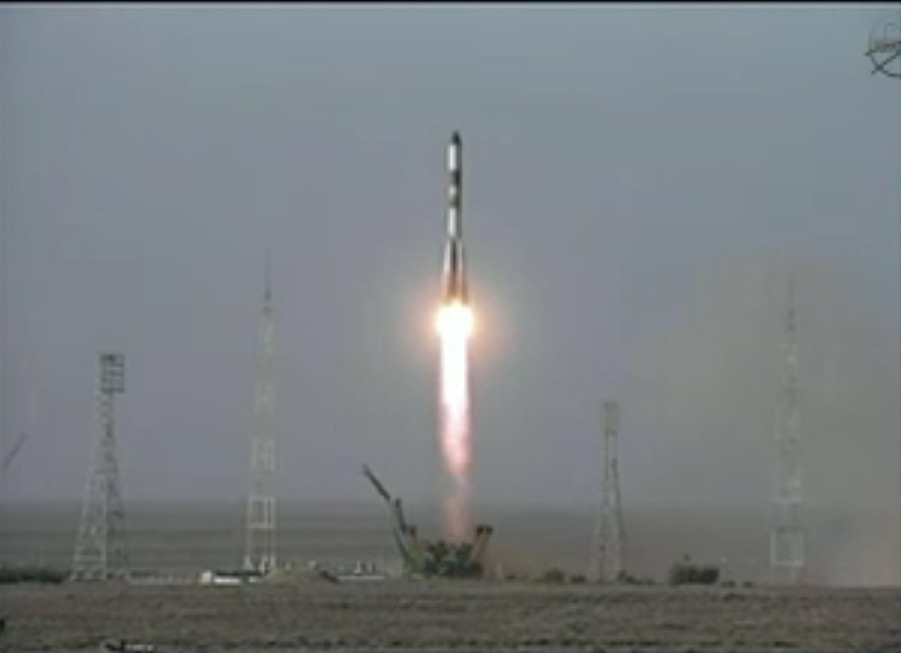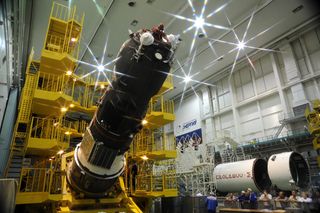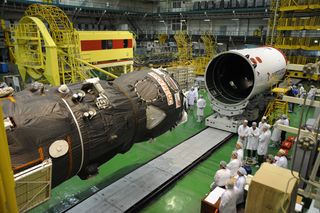Russian Space Station Cargo Ship Crashes in Failed Rocket Launch

This story was updated at 2:36 p.m. EDT.
An unmanned Russian cargo ship carrying tons of supplies for astronauts on the International Space Station crashed back to Earth today (Aug. 24) when its rocket suffered a major malfunction, NASA officials say.
The robotic Progress 44 cargo ship blasted off atop a Soyuz U rocket at 9 a.m. EDT (1300 GMT) from the central Asian spaceport of Baikonur Cosmodrome in Kazakhstan and was due to arrive at the space station on Friday.
"Unfortunately, about 325 seconds into flight, shortly after the third stage was ignited, the vehicle commanded an engine shutdown due to an engine anomaly," NASA station program manager Mike Suffredini told reporters today. "The vehicle impacted in the Altai region of the Russian Federation." [Photo of the Progress 44 launch]
Russia's lost cargo ship
A video of the Progress cargo ship launch shows the vehicle soaring into a clear blue sky. It is the second launch failure within a week for Russia's space program, which typically launches Soyuz rockets successfully.
Suffredini said this is the first failure of a Soyuz rocket and Progress vehicle in the more than 10 years Russia has been launching them to the International Space Station.
Get the Space.com Newsletter
Breaking space news, the latest updates on rocket launches, skywatching events and more!
Progress 44 was packed with about 2.9 tons of food, fuel and supplies for the space station, which is currently home to six astronauts representing the United States, Russia and Japan. None of the cargo items lost is irreplaceable and the station's current crew is at no risk of running out of supplies, Suffredini said.
"We can go several months without a resupply vehicle if that becomes necessary," Suffredini said, adding that the orbiting lab is stocked up to last through March 2012, when a European cargo ship is expected to arrive.
The space station is currently stocked by Russia's Progress vehicle and robot cargo ships built by the European and Japanese space agencies. [What are Russia's Progress Spaceships?]
Investigation under way
However, how today's Soyuz rocket failure affects plans for four more launches later this year to ferry new crews and cargo shipments to the space station remains to be seen. Two Soyuz crew launches and two Progress deliveries were on the launch schedule before today's incident.
A crew-carrying version of the Soyuz rocket, called the Soyuz FG, was due to launch a Soyuz capsule carrying three astronauts to the space station on Sept. 22. But that Soyuz FG rocket shares many similarities with the Soyuz U version that failed today, so Russian space officials must find the cause of the current failure before any more Soyuz capsules or Progress vehicles can fly.
"Obviously this has implications to the vehicle on orbit and the crew as well," Suffredini said, adding that he's confident Russian space officials will identify the cause.
NASA retired its space shuttle fleet in July and currently relies solely on Russia to ferry astronauts and cargo to the International Space Station. The U.S. space agency also plans to use American-built cargo and crew-carrying vehicles once they become available in the next few years.
The six-man crew on the station today arrived in teams of three on a staggered schedule. One of those teams will have to return to Earth in October on their Soyuz capsule, so NASA and its space station partners will have to decide by then whether to partially evacuate the orbiting lab and leave it staffed with a three-person crew until normal launches resume, Suffredini said.
Meanwhile, Maxim Matuchen, head of the Russian Mission Control Center, radioed the space station to relay news of the Progress 44 launch failure to the crew.
"This is it for the moment, we'll try to figure out what has happened and what the cause was. I just wanted to keep you informed," Matuchen said, according to a NASA translation.
"Thank you for letting us know so quickly," the station's Russian commander Andrey Borisenko radioed back. "Thank you from the entire crew."

A reliable spacecraft
Russia's Progress spacecraft and Soyuz rockets have a long track record of reliability. They have been hauling cargo to the International Space Station since the first crew took up residence in 2001.
The latest Progress vehicle to depart the space station undocked from the orbiting lab early Tuesday to make room for the new Progress 44 replacement.

The Progress cargo ships resemble the country's three-module Soyuz capsules that carry cosmonauts and astronauts into orbit. However, Progress vehicles carry a fuel pod in place of a crew module in order to replenish the space station's supplies.
But it was the similarities that Suffredini said first came to his mind after hearing of the launch failure.
"I know the Progress and Soyuz both use the same booster, and so immediately started worrying about how quick we were going to work this out," he said.
This is the second Russian spacecraft to be lost during launch in six days.
On Aug. 18, the $300 million Russian communications satellites Express AM4 failed to reach the proper orbit after it blasted off atop a Proton rocket, a different model than the booster carrying Progress 44. That satellite was later found drifting in the wrong orbit, according to Russian space officials.
Suffredini said he is not aware of any similarities between the upper rocket stage that failed during the Proton launch, and today's Soyuz booster failure. But he is confident that the cause will be identified.
"I was disappointed that we lost the spacecraft, but frankly, I think we'll sort this one out and we'll get to flying again," Suffredini said. "And we'll learn from it and move on."
You can follow SPACE.com Managing Editor Tariq Malik on Twitter @tariqjmalik. Follow SPACE.com for the latest in space science and exploration news on Twitter @Spacedotcomand on Facebook.
Join our Space Forums to keep talking space on the latest missions, night sky and more! And if you have a news tip, correction or comment, let us know at: community@space.com.

Tariq is the Editor-in-Chief of Space.com and joined the team in 2001, first as an intern and staff writer, and later as an editor. He covers human spaceflight, exploration and space science, as well as skywatching and entertainment. He became Space.com's Managing Editor in 2009 and Editor-in-Chief in 2019. Before joining Space.com, Tariq was a staff reporter for The Los Angeles Times covering education and city beats in La Habra, Fullerton and Huntington Beach. In October 2022, Tariq received the Harry Kolcum Award for excellence in space reporting from the National Space Club Florida Committee. He is also an Eagle Scout (yes, he has the Space Exploration merit badge) and went to Space Camp four times as a kid and a fifth time as an adult. He has journalism degrees from the University of Southern California and New York University. You can find Tariq at Space.com and as the co-host to the This Week In Space podcast with space historian Rod Pyle on the TWiT network. To see his latest project, you can follow Tariq on Twitter @tariqjmalik.